Health & Education
We all want the best care possible for our horses. The Heath & Education section covers both Learning Institutions, Organizations as well as many sources for equine assistance including Veterinarians and Farriers.
For those who want a to formally study horses, the Education section includes College Riding, Equine Studies, and Veterinary Schools. Learn about the wide variety of horses in the Horse Breeds section. Supplements and Treatments Therapy are also included in the section.
Everyone can learn from Fine Art and there are some specialty Museums that might surprise you.
Horses as a therapy partner enrich the lives of the disabled. These facilities are listed in our Therapeutic Riding section. To help children and young adults build confidence and grow emotionally, please see the resources available on the Youth Outreach page.
Looking for a place to keep your horse? You can find it in the Horse Boarding section. Traveling? Find a Shipping company or Horse Sitting service if your horse is staying home!
Want to stay up to date with the latest training clinics or professional conferences? Take a look at our Calendar of Events for Health & Education for the dates and locations of upcoming events.
Do we need to add more? Please use the useful feedback link and let us know!
Watch the story of the incredible impact that a small nonprofit organization is having on the community of Oakland, California. “We Ride Too” is committed to serving a wide range of young people in the Oakland area who face various challenges and traumas with limited access to resources. Through programs for youth to connect with nature and horses, each child has a place where they are told they "can," instead of "can't," breaking barriers and making a difference for their mental health and future.
As part of our mission to spread awareness of the healing power of horses, we seek to share stories of transformation that illustrate the healing journey and personal growth people can experience through the involvement of horses in mental health programs and services.
In this episode of StallSide, we sit down with Dr. Katie Garrett, the current president of the American Association of Equine Practitioners (AAEP). Dr. Garrett shares her insights on the evolving landscape of equine veterinary medicine, the role of AAEP in shaping the future of the profession, and the challenges and opportunities facing equine practitioners today. She also highlights the important work of The Foundation for the Horse, the charitable arm of the AAEP, which supports equine welfare through education, research, emergency relief, and equitarian initiatives that provide care to underserved horse populations. Tune in to hear about her leadership journey, key initiatives within AAEP, and how the organization and its foundation are advancing equine health and supporting veterinarians in delivering the highest standard of care for horses.
There once was a horse called Ace who used to bite and intimidate people. Watch as his owner seeks Monty Roberts' help to change this behavior and witness how quickly Ace learns to become a good citizen. See how his owner works with Certified Monty Roberts Instructor Maya Horsey to learn ways to establish clear consistent boundaries and improve the relationship with Ace. Go to: montyroberts.university.com.
Read more: Monty Roberts Equus Online University - Ace used to bite and intimidate people (2:20)
Putting a leather pad on a sore footed horse.
Read more: Painful Horse Hoof - Satisfying Therapeutic Horseshoeing
While successful in her corporate career, Adina was struggling with feeling burned out, losing her spark and increasingly unmotivated. Deciding to get help, she attends a personal growth workshop incorporating horses to address her burnout.
Watch how the horses play a pivotal role in her self-discovery and transformation. Through a series of experiences with horses, Adina learns to focus on the present and develops a new sense of joy, connection, and meaningful purpose.
As part of our mission to spread awareness of the healing power of horses, we seek to share stories of transformation that illustrate the healing journey and personal growth people can experience through the involvement of horses in mental health programs and services.
Help us raise awareness of the power of horses by sharing this video and supporting the Seen Through Horses Campaign.
Read more: "Finding Her Voice" Story of Transformation | Seen Through Horses Campaign (3:02)
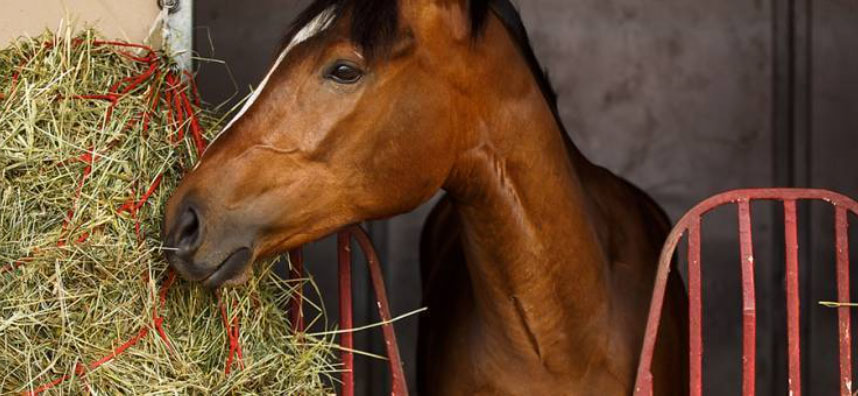
By Kentucky Equine Research Staff
The digestive system of horses and ponies is designed to process forage for the majority of each day. With modern management practices, however, horses are often maintained in stalls and fed meals twice daily, which can be consumed in a few hours or less. Horses left without forage for more than four or five hours may develop gastrointestinal or behavioral problems.
One option for decreasing the amount of time a horse spends without forage is the use of slow feeders. A recent study showed that consumption time was up to 61% higher when ponies were given access to partially filled haynets than when fed hay on the ground.
Another study exploring the benefits of slow feeders tracked chewing patterns with various slow-feeding devices.* Those researchers hypothesized that haynets with smaller holes would increase chewing frequency compared with feeding on the ground. Chewing stimulates the production of saliva, which contains bicarbonate, a compound that buffers the acidity in the stomach. More chewing produces more bicarbonate.
“Horses continuously produce gastric acid but only produce saliva while they are chewing. Therefore, continuous chewing can help reduce the risk of gastric ulcers by producing bicarbonate in the saliva,” explained Ashley Fowler, Ph.D., a nutritionist for Kentucky Equine Research.
To test the hypothesis that haynets increase chewing and alter chewing dynamics, the researchers fitted eight horses with “chewing halters.” These devices recorded individual chews using a pressure sensor on the noseband. Horses were maintained in stalls and fed bermudagrass at 1.5% body weight twice daily at 8 a.m. and 4 p.m. The researchers calculated the number of chews per kilogram of hay, chewing duration (total time spent chewing per day), and the percent of chews completed in the first 120 and 240 minutes of feeding. Horses were fed using haynets with large holes, haynets with small holes, haynets with only a bottom hole, and unrestricted off the stall floor.
Contrary to the researchers’ hypothesis, the haynets did not increase chewing frequency. Horses fed from the small hole haynet, however, had a longer chewing duration than horses fed off the stall floor. Further, fewer chews were completed in the first 240 minutes of being fed for horses feeding from small hole haynets compared to haynets with a single bottom hole.
“This research shows that slow feeders do not increase the number of chews for a specific amount of hay, but the small hole haynet did lengthen the amount of time that the horse spent chewing. This study also found that the horses had an increased rate of consumption from the haynets with a single bottom hole, which means not all slow feeders are created equal and need to be carefully evaluated,” advised Fowler.
In addition to access to forage, another way of protecting the sensitive squamous region of the stomach from acid damage is by offering a product containing antacids and stomach-coating agents.
Fowler added, “The squamous, or upper, portion of the stomach has fewer protective mechanisms against acid compared to the glandular, or lower, portion of the stomach and is more susceptible to developing ulcers from acid splash. Along with stimulating alkaline saliva production, consuming forage also helps create a fiber mat in the stomach, providing a physical ‘splash-guard’ to stop the acid from spraying on the squamous mucosa.”
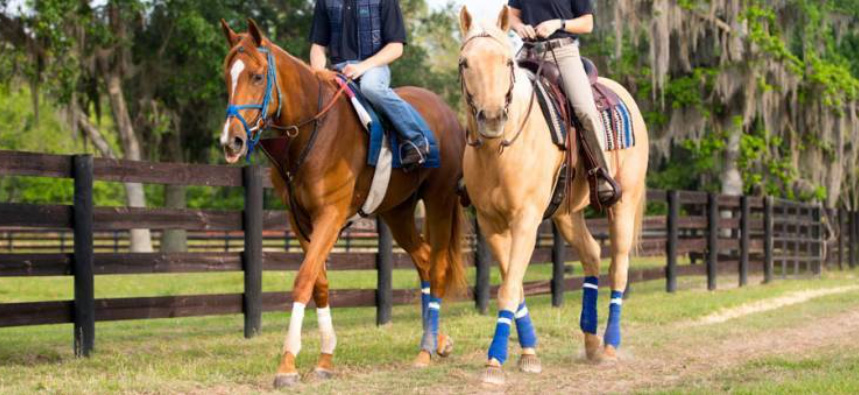
By Kentucky Equine Research Staff
An average Thoroughbred’s racing career spans only a few years, yet horses often live well into their 20s and sometimes into their 30s. Successful transition to a second career helps protect and build the Thoroughbred industry, improving the welfare of horses as well as the image of racing in general.
According to a recent study of off-track Thoroughbreds (OTTB) sold through an online auction, some horses are more likely to be adopted than others.* Here’s why:
Age. A horse’s sale price increases until it peaks at the age of 9 years old when it begins to decrease. The value continues to decrease each additional year. By 19 years old, the horse would probably be given away rather than sold.
Gender. Mares sold for about $924 less than geldings. “In this study, there was a larger number of mares. Of 170 horses included in the study, 63% were mares,” explained Kathleen Crandell, Ph.D., of Kentucky Equine Research.
Color. Chestnut, gray, or roan horses were valued at more than $1,000 compared to bay, brown, or black horses. “This could have been because the more popular colors were less common, with only 26% of the 170 horses in this study chestnuts and only 12% gray or roan, which is less than half of the study population,” Crandell said.
Registrations. Horses registered with the United States Equestrian Federation, United States Hunter Jumper Association, or United States Eventing Association had an added value of nearly $2,000. “Horses with showing or competition experience appear more popular. Potential buyers can look up the horse’s past placings, and likely have more confidence regarding whether the horse was suitable for competition,” explained Crandell.
“This may also reflect some concern for injuries,” she added. “For example, horses that have not competed may have been injured on the track and therefore may not be able to compete in second careers and might be more suited to trail riding.”
“Understanding market demands can help identify desired characteristics for Thoroughbreds entering alternative disciplines, which may in turn improve welfare by better aligning buyer demand with available market supply,” wrote the researchers.
Ultimately, improving our understanding of factors that make Thoroughbred marketable will lead to long-term placement of OTTBs in new careers.
According to Crandell, “These horses can have special nutritional demands as a result of intense training at the track. Making sure they have a balanced diet is key to transitioning to a successful second career.”
Joint supplements are among the most popular nutritional supplements given to equine athletes. These can include glucosamine, chondroitin sulfate, hyaluronic acid, and even long-chain omega-3 fatty acids. A focus on joint health also includes maintaining an appropriate body weight, which proves problematic even for some athletic horses.
Read more: Which Off-Track Thoroughbreds Are Most Desirable?
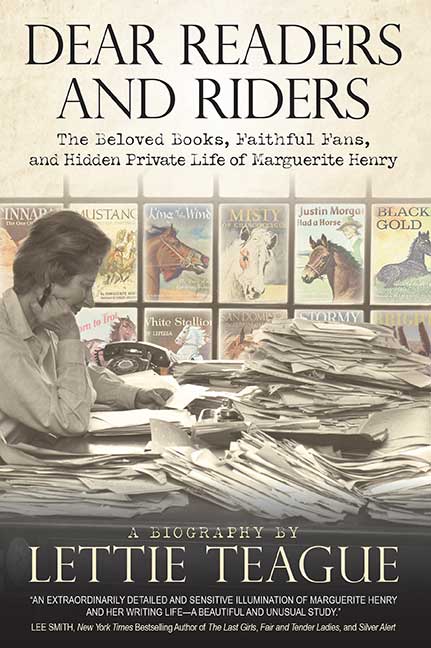
By Lettie Teague
Although beloved children’s book author Marguerite Henry wrote fifty-nine books, a surprisingly small number of them—just five—were made into movies. When a reporter for the Carpentersville, Illinois, Cardunel Free Press (January 1968) declared, “So popular are Mrs. Henry’s books with young people of all ages that motion picture producers vie for the privilege of bringing them to the screen,” that assertion owed more to hyperbole than fact. The five books that made the transition to the screen included Misty of Chincoteague, King of the Wind, and Brighty of the Grand Canyon, which debuted on the big screen, and two that became made-for-television movies: Justin Morgan Had a Horse and Peter Lundy and the Medicine Hat Stallion, based on the original San Domingo book.
Misty of Chincoteague
Although it didn’t come close to equaling the popularity of the book, the Misty movie, produced in 1961, proved tremendously popular for many years. The film was directed by James B. Clark (who also directed the much-beloved Cary Grant/Deborah Kerr tear-jerker An Affair to Remember, among other films). The Misty movie possessed several advantages when it debuted, the most important of which was the still-living real pony (although Misty was too old to star in the film), and then of course Marguerite, who was not only present at the filming, but also promoted the movie at every turn. In one such effort, Marguerite wrote a piece entitled “Misty Makes the Movies,” published in Junior Libraries, where she marveled at the production that she flew down to witness firsthand. There were three hundred extras (mostly Chincoteaguers) and one hundred and fifty ponies, plus the famed horse trainer Les Hilton “who can run as fast as the ponies he trains,” Marguerite wrote. “I listened spellbound to the jargon: Quiet! Roll it!”
The movie starred David Ladd, son of the much more famous actor Alan Ladd, who later became an MGM film executive. Filmed on location, it was less than a masterpiece with often stilted dialogue and pretty low-wattage drama. In perhaps the strangest twist of all, the pony that played Misty wasn’t even a pinto pony but a very pale palomino. With all the ponies in the world, it was hard to believe that the filmmakers could not find a pony that at least slightly resembled Misty.
Marguerite was quite disappointed by this fact and made her feelings known on more than one occasion. By contrast, she was thrilled by the performances of David Ladd as Paul Beebe and Pam Smith as Maureen Beebe. “They are not acting at all. Each rides like the wind, each has loved a special pony and lost it in death. Their laughter and their tears are real. And they even look like Paul and Maureen!” Marguerite declared.
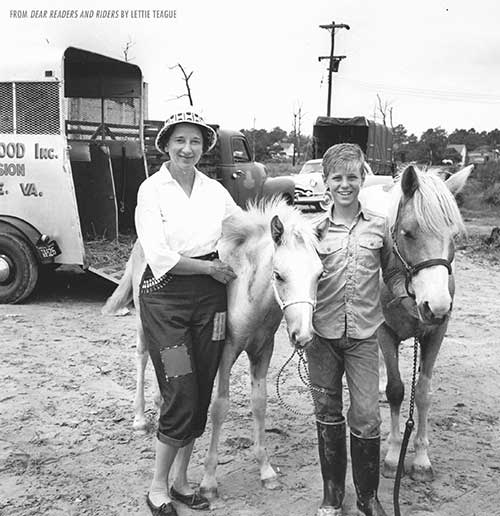
Brighty of the Grand Canyon
It was another six years before a book by Marguerite was turned into a movie again. This time it was Brighty of the Grand Canyon (1967), directed by Norman Foster, who was then famous for directing Davy Crockett and Charlie Chan movies. But it was the film’s producer, Stephen Booth, who was responsible for bringing Marguerite’s book to the big screen. In an interview with John Bustin, entertainment editor of The Austin American-Statesman (June 8, 1967), Booth recounted how his wife Betty bought a copy of Brighty for their three young sons and how they read it aloud. All five Booths were entranced by the story.
Booth wanted to make the book into a movie but was convinced that Disney owned the screen rights. “But I kept thinking about a movie of the book, so I finally wrote Rand McNally to see who owned the rights and found out, to my amazement, that they still did,” said Booth.
The problems began when Booth decided that in order for the film to be as authentic as possible, they needed to do all of the filming on site at the Grand Canyon. This made the film complicated—and quite expensive as well. Everything had to be brought into the canyon by muleback or helicopters, and they had to film in all four seasons, so the crew worked in blazing heat and during blizzards, in just a few months’ time. The unpredictability of working with animals was a complicating factor as well. “I don’t know that I’ll necessarily go after more animal stories,” said the chastened Booth. And he did not. Brighty was his first and last production. The real-life Brighty (aka Jiggs), who starred in the film and was well-supplied with his favorite peppermints throughout the screening, went home to Marguerite and later to the home of “Tex” Drexler, where he remained the rest of his life.
Justin Morgan Had a Horse
Although Justin Morgan Had a Horse was Marguerite’s first full-length book, it was her third book-made-into-a-movie, specifically a Disney made-for-television movie that debuted in 1972. The movie rights had actually been acquired years earlier by Disney veteran producer Harry Tytle, but Walt Disney, who had been working with Tytle, died quite suddenly in the middle of the film’s development, and it had to be shelved (Atlanta Constitution, February 6, 1972).
The star of the movie was Don Murray, an actor later best known for his role on the long-running soap opera Knots Landing. Murray played Justin Morgan and his love interest was played by Lana Wood. Never mind that such a character didn’t exist in the book, but then she didn’t get much of a role in the movie either. Gary Crosby, son of Bing (and a horseman), played a supporting role. The film was billed as “an inspirational story with wide appeal for both children and adults” that depicted an all-American story of the hardships and triumphs of Justin Morgan (schoolmaster) and his horse. The movie received generally good reviews, although, like Misty, it wasn’t near the equal of Marguerite’s book. (The slow-motion scenes of the racing Figure are arguably some of the best scenes in the film.)
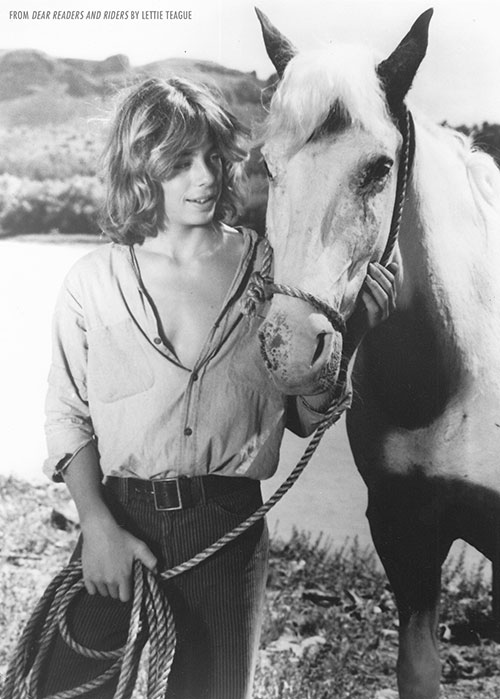
San Domingo
The next Marguerite book-made-movie was another made-for-television special, although the movie had a different name than the original edition of the book (San Domingo). Peter Lundy and the Medicine Hat Stallion (1977) was the creation of famed producer Ed Friendly, who had several hits to his name, including Little House on the Prairie. (A later edition of the book matched the name of the film.)
Peter Lundy was played by the then-fifteen-year-old heartthrob Leif Garrett, who was a major teen star in the 1970s and had already appeared in several films and television shows. Garrett was soon to embark on a singing career, and the movie was originally intended to be a pilot for a television series, which Garrett hoped would help further his musical career. Sadly, the network declined to commission the series, and the first Peter Lundy TV movie was also the last.
Although Marguerite’s story of San Domingo had been set in Nebraska Territory, the movie was filmed on location in New Mexico, where Garrett, who did all his own riding in the movie, told an interviewer, “I like horses a lot and can ride fairly well,” which must have pleased Marguerite. The movie received generally positive reviews and was considered a boon for Garrett’s career, which sadly soon derailed in a battle with drug addiction and alcohol abuse before the star finally got sober as a much older adult. On a happier note, the horse that played San Domingo won a Craven Award, named for Richard C. Craven, the first director of the American Humane Association. The award is given to animals who have a special ability or talent. (And notably, unlike the Misty pony of that movie, the San Domingo television character looked like the horse that had been drawn for the book.)
King of the Wind
Perhaps it was fitting that the book that many believe to be Marguerite’s very best was the last time her work would be translated into a film. Filmed in England and Turkey, the King of the Wind movie (1990) was produced by a consortium of no less than seven men, including Peter Davis (best known for the Highlander films). It costarred Richard Harris and Glenda Jackson with Navin Chowdhry as Agba. It was directed by Peter Duffell, who also directed another great horse-centric classic, The Adventures of Black Beauty, a series that ran for two years (1972 to 1974). King of the Wind was screened in very few theaters in the United States and seemed to disappear altogether soon after it was made.
Nine years before King of the Wind’s eventual theatrical release, Marguerite had written a letter to the King Brothers film production company (October 7, 1981), offering to pay the company twenty-five thousand dollars to buy back the rights to King of the Wind, which it held at the time. (She eventually paid thirty thousand dollars.) As to her percentage of the film’s profits, Marguerite’s reply to King was a disheartening reckoning of just how far from a windfall her experience of turning her books into movies had been. “I’ve had only four films based on my books, and in each case (Disney, 20th Century Fox, Booth Productions and NBC) it was break-even. One of the previous four I was ‘out of pocket,’” she wrote.
This excerpt adapted from Dear Readers and Riders: The Beloved Books, Faithful Fans, and Hidden Private Life of Marguerite Henry is reprinted with permission from Trafalgar Square Books (TrafalgarBooks.com).
Dear Readers and Riders: The Beloved Books, Faithful Fans, and Hidden Private Life of Marguerite Henry
BUY NOW on Amazon
Paperback | Kindle
This excerpt from Dear Readers and Riders: The Beloved Books, Faithful Fans, and Hidden Private Life of Marguerite Henry is reprinted with permission from Trafalgar Square Books. Visit them online at Horse & Rider Books. All photos courtesy of Horse & Rider Books.
There a more really interesting books on riding and all aspects of equestrian living in our section on Books.
Julie Goodnight shows you Danger Zones when working around the horse.
Read more: Danger Zones with Julie Goodnight and Christy Landwehr
- 32 and You: An Owner's Guide to Genetic Tests in Horses (55:02) - Cornell Equine Seminar
- Poor Horse Behavior? It Could Be Pain Related
- The Power of Horses | Supporting Mental Health in Rural Communities (7:58)
- Tackling Thrush in Horses
- Addressing the Shortage of Equine Veterinarians: Nationwide Practices Join Together
- Rood & Riddle Stallside Podcast - Breaking Ground in Laminitis Research with Dr Andrew van Eps (38:13)
- Horse Miscarriages Offer Clues to Causes of Early Human Pregnancy Loss - Cornell Veterinary Medicine
- A 6-Step Guide to Keeping Your Horse Healthy
- Performing Treadmill Endoscopy at Rood & Riddle Equine Hospital (1:59)
- Rood & Riddle Stallside Podcast - Tall Fescue Woes: Insights on Endophyte Ingestion
- Rood & Riddle Stallside - Understanding Equine Biomechanics and Farriery with Dr Jenny Hagen
- Regenerative Medicine Therapies in Horses
- Educational Benefits of Equine-Assisted Learning Programs for Students
- Why is the Mule the Most Important Member of the Horse Family? Cornell Equine Seminar
- Five Tips for Keeping Your Horse Sound - Cornell Vet Equine Seminar Series
- Deworming the horse using a paste syringe with Teresa Kackert
- Stable Vices: Theirs or Ours? Abnormal Behavior in Horses
- FAQ: Lameness and Arthritis in Horses
- How to Safely Pony a Horse with Teresa Kackart (6:55) - Certified Horsemanship Association
- Equine Emergencies 101: What To Do When the Worst Happens from Cornell Equine Seminar

































